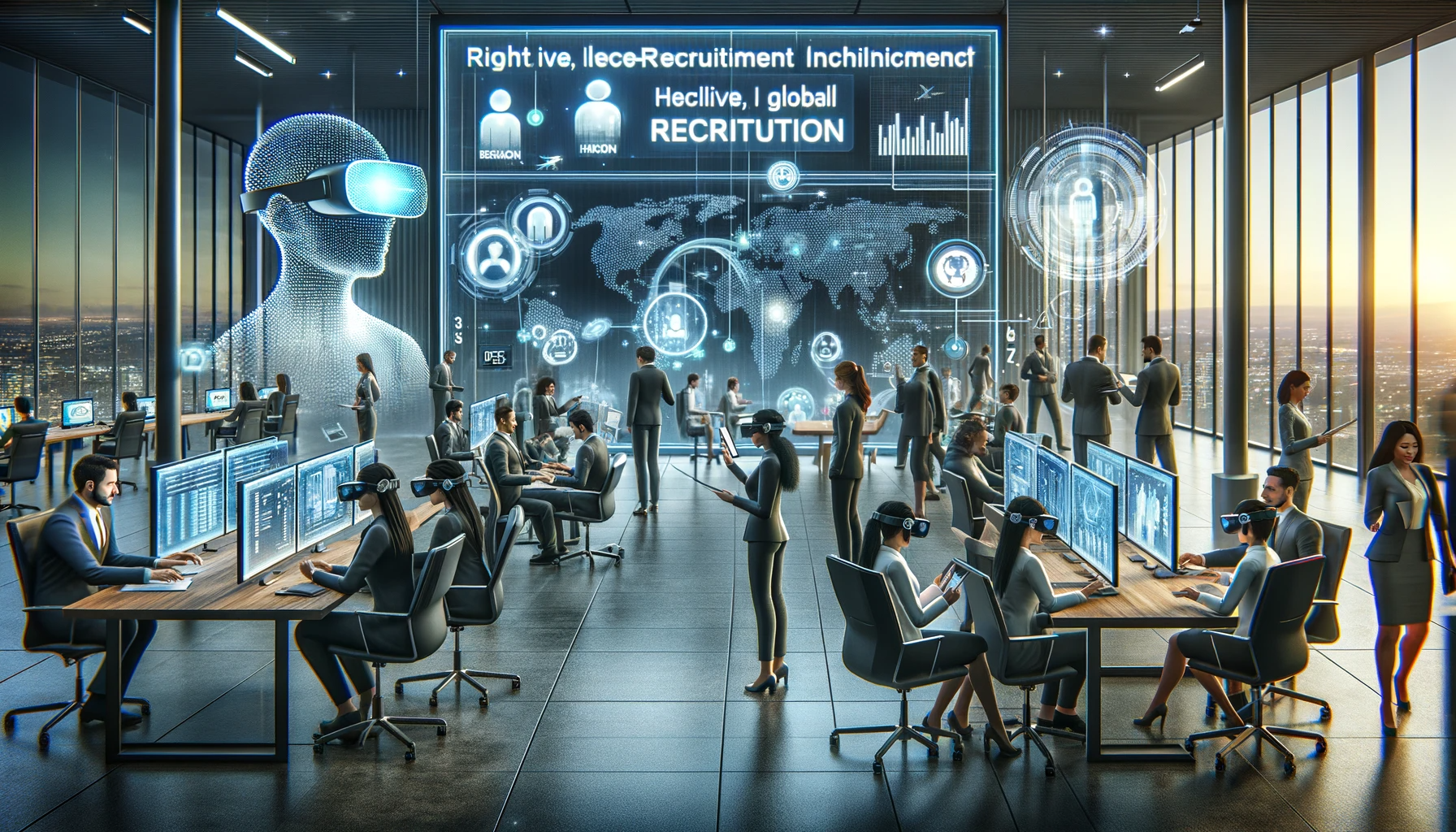Recruiting the right talent efficiently is crucial for the success and growth of any organization....
Exciting Glimpse into the Future of Recruitment - 2035!
 What are the challenges facing the recruitment business face now?
What are the challenges facing the recruitment business face now?
The recruitment business faces several challenges in the modern era, including:
-
Talent Shortage: There is often a mismatch between the skills available in the job market and the skills required by employers. Certain industries and technical fields face a significant shortage of qualified candidates.
-
Technological Advancements: Keeping up with the latest technology, such as artificial intelligence and machine learning for talent acquisition and management, can be challenging. Adapting to these technologies requires investment in training and infrastructure.
-
Diversity and Inclusion: Many companies are striving to improve diversity and inclusion in their workforce. This presents a challenge for recruiters to find diverse talent pools and address unconscious biases in the hiring process.
-
Changing Candidate Expectations: Modern job seekers have different expectations regarding workplace flexibility, benefits, company culture, and career development opportunities. Catering to these expectations while aligning with the company’s needs can be difficult.
-
Compliance with Regulations: Keeping up with and complying with employment laws and regulations, which can vary greatly by region and country, is a constant challenge.
-
Globalization and Remote Work: The rise of remote work and globalization has expanded the talent pool globally, which presents both an opportunity and a challenge in terms of managing different time zones, cultures, and legal frameworks.
-
Economic Uncertainty: Fluctuations in the economy, such as recessions, can impact hiring trends and budgets, making it challenging to plan and execute recruitment strategies effectively.
-
Data Privacy and Security: With the increasing use of digital platforms for recruitment, ensuring the privacy and security of candidate data is paramount and challenging.
-
Employer Branding: Building and maintaining a strong employer brand to attract top talent is crucial but can be challenging, especially for smaller or less known companies.
-
High Competition: The competition for top talent is fierce, especially in certain industries, making it hard for companies to stand out and attract the best candidates.
These challenges require recruitment businesses to be adaptable, technologically savvy, and attuned to the evolving dynamics of the job market and candidate preferences.
How will the recruitment business look like in 2035
Predicting the exact state of the recruitment business in 2035 involves some speculation, but current trends suggest several possible developments:
-
Advanced Technology Integration: By 2035, AI and machine learning will likely be deeply integrated into the recruitment process, enabling more efficient candidate sourcing, screening, and matching. Technologies like natural language processing could automate and personalize communication with candidates.
-
Data-Driven Decision Making: The use of big data in recruitment will become more sophisticated, allowing for predictive analytics to forecast hiring needs, candidate success, and even turnover rates. This will lead to more strategic and informed decision-making in talent acquisition.
-
Virtual and Augmented Reality: These technologies could be used for virtual job fairs, interviews, and even office tours, providing a more immersive and interactive candidate experience.
-
Remote Work as a Norm: The rise of remote work could lead to global talent pools becoming the standard. Recruitment processes and strategies will adapt to cater to a more diverse, international workforce.
-
Emphasis on Soft Skills and Potential: As technical skills may become outdated more rapidly, there will be a greater focus on soft skills, adaptability, and learning potential in candidates.
-
Customized Candidate Experience: The recruitment process might become highly personalized, with AI-driven systems offering candidates tailored job recommendations, interview advice, and onboarding processes based on their unique profiles.
-
Blockchain in Recruitment: Blockchain technology could be used for verification of candidates' credentials and work history, making the process more transparent and secure.
-
Sustainable and Ethical Hiring Practices: There will likely be a greater emphasis on sustainable business practices and corporate social responsibility in recruitment, aligning with broader societal values.
-
Gig Economy Expansion: The gig economy might expand further, leading to more freelance, part-time, and contract work. Recruitment strategies will need to adapt to this shift in employment patterns.
-
Enhanced Focus on Diversity and Inclusion: Efforts to create diverse and inclusive workplaces will continue to grow, with recruitment practices evolving to reduce bias and promote equity.
-
Legal and Regulatory Changes: New laws and regulations regarding employee rights, data privacy, and remote work could significantly impact recruitment practices.
-
Collaboration with Educational Institutions: There might be stronger collaborations between businesses and educational institutions to ensure the workforce is equipped with relevant skills for the future.
-
Employee Experience and Well-being: There will be a greater focus on the overall employee experience, including mental health and well-being, right from the recruitment stage.
-
Shift in Candidate Expectations: Candidates might prioritize different aspects of work, such as purpose, social impact, flexibility, and work-life balance, influencing how organizations position themselves to attract talent.
-
Automated and Continuous Learning: Continuous skill development will become a key part of employment, with organizations and employees focusing on lifelong learning and adaptability.
While these predictions are based on current trends, it's important to note that unforeseen technological advancements, economic factors, and social changes could significantly alter the landscape of the recruitment business by 2035.

%20Define%20Job%20Requirements%20Clearly%2c%202)%20.webp?height=200&name=DALL%C2%B7E%202024-07-04%2020.27.39%20-%20A%20detailed%20infographic%20illustrating%20an%20efficient%20hiring%20process.%20The%20infographic%20should%20include%20nine%20sections_%201)%20Define%20Job%20Requirements%20Clearly%2c%202)%20.webp)

